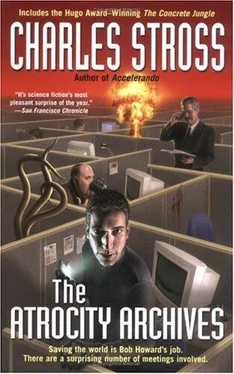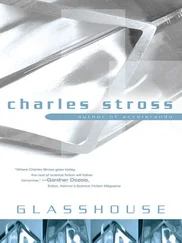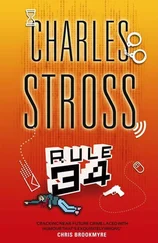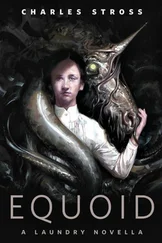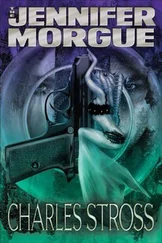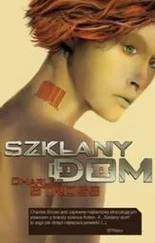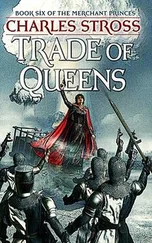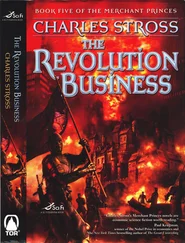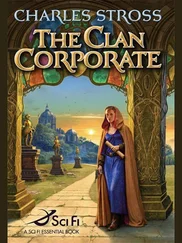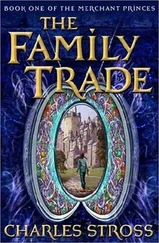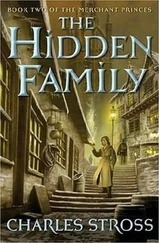Charles Stross - The Atrocity Archives
Здесь есть возможность читать онлайн «Charles Stross - The Atrocity Archives» весь текст электронной книги совершенно бесплатно (целиком полную версию без сокращений). В некоторых случаях можно слушать аудио, скачать через торрент в формате fb2 и присутствует краткое содержание. Жанр: Киберпанк, на английском языке. Описание произведения, (предисловие) а так же отзывы посетителей доступны на портале библиотеки ЛибКат.
- Название:The Atrocity Archives
- Автор:
- Жанр:
- Год:неизвестен
- ISBN:нет данных
- Рейтинг книги:3 / 5. Голосов: 1
-
Избранное:Добавить в избранное
- Отзывы:
-
Ваша оценка:
- 60
- 1
- 2
- 3
- 4
- 5
The Atrocity Archives: краткое содержание, описание и аннотация
Предлагаем к чтению аннотацию, описание, краткое содержание или предисловие (зависит от того, что написал сам автор книги «The Atrocity Archives»). Если вы не нашли необходимую информацию о книге — напишите в комментариях, мы постараемся отыскать её.
The Atrocity Archives — читать онлайн бесплатно полную книгу (весь текст) целиком
Ниже представлен текст книги, разбитый по страницам. Система сохранения места последней прочитанной страницы, позволяет с удобством читать онлайн бесплатно книгу «The Atrocity Archives», без необходимости каждый раз заново искать на чём Вы остановились. Поставьте закладку, и сможете в любой момент перейти на страницу, на которой закончили чтение.
Интервал:
Закладка:
ACKNOWLEDGEMENTS
Authors write, but not in a vacuum. Firstly, I owe a debt of gratitude to the usual suspects-members of my local writers workshop all-who suffered through first-draft reading hell and pointed out numerous headaches that needed fixing. Paul Fraser of Spectrum SF applied far more editorial muscle than I had any right to expect, in preparation for the original magazine serialization; likewise Marty Halpern of Golden Gryphon Press, who made this longer edition possible. Finally, I stand on the shoulders of giants. Three authors in particular made it possible for me to imagine this book and I salute you, H. P. Lovecraft, Neal Stephenson, and Len Deighton.
Introduction CHARLIE'S DEMONS
"THE ATROCITY ARCHIVE" IS A SCIENCE FICTION novel. Its form is that of a horror thriller with lots of laughs, some of them uneasy. Its basic premise is that mathematics can be magic. Its lesser premise is that if the world contains things that (as Pratchett puts it somewhere) even the dark is afraid of, then you can bet that there'll be a secret government agency covering them up for our own good. That last phrase isn't ironic; if people suspected for a moment that the only thing Lovecraft got wrong was to underestimate the power and malignity of cosmic evil, life would become unbearable. If the secret got out and (consequently) other things got in, life would become impossible. Whatever then walked the Earth would not be life, let alone human. The horror of this prospect is, in the story, linked to the horrors of real history. As in any good horror story, there are moments when you cannot believe that anyone would dare put on paper the words you are reading. Not, in this case, because the words are gory, but because the history is all too real. To summarise would spoil, and might make the writing appear to make light of the worst of human accomplishments. It does not. Read it and see.
Charlie has written wisely and well in the Afterword about the uncanny parallels between the Cold War thriller and the horror story. (Think, for a moment, what the following phrase would call to mind if you'd never heard it before: "Secret intelligence.") There is, however, a third side to the story. Imagine a world where speaking or writing words can literally and directly make things happen, where getting one of those words wrong can wreak unbelievable havoc, but where with the right spell you can summon immensely powerful agencies to work your will. Imagine further that this world is administered: there is an extensive division of labour, among the magicians themselves and between the magicians and those who coordinate their activity. It's bureaucratic, and also (therefore) chaotic, and it's full of people at desks muttering curses and writing invocations, all beavering away at a small part of the big picture. The coordinators, because they don't understand what's going on, are easy prey for smooth-talking preachers of bizarre cults that demand arbitrary sacrifices and vanish with large amounts of money. Welcome to the IT department.
It is Charlie's experience in working in and writing about the Information Technology industry that gives him the necessary hands-on insight into the workings of the Laundry. For programming is a job where Lovecraft meets tradecraft, all the time. The analyst or programmer has to examine documents with an eye at once skeptical and alert, snatching and collating tiny fragments of truth along the way. His or her sources of information all have their own agendas, overtly or covertly pursued. He or she has handlers and superiors, many of whom don't know what really goes on at the sharp end. And the IT worker has to know in their bones that if they make a mistake, things can go horribly wrong. Tension and cynicism are constant companions, along with camaraderie and competitiveness. It's a lot like being a spy, or necromancer. You don't get out much, and when you do it's usually at night.
Charlie gets out and about a lot, often in daylight. He has no demons. Like most people who write about eldritch horrors, he has a cheerful disposition. Whatever years he has spent in the cellars haven't dimmed his enthusiasm, his empathy, or his ability to talk and write with a speed, range of reference, and facility that makes you want to buy the bastard a pint just to keep him quiet and slow him down in the morning, before he gets too far ahead. I know: I've tried. It doesn't work.
I first encountered Charles Stross when I worked in IT myself. It was 1996 or thereabouts, when you more or less had to work in IT to have heard about the Internet. (Yes, there was a time not long ago when news about the existence of the Internet spread by word of mouth .) It dawned on me that the guy who was writing sensible-but-radical posts to various newsgroups I hung out in was the same Charles Stross who'd written two or three short stories I'd enjoyed in the British SF magazine Interzone : "Yellow Snow," "Ship of Fools," and "Dechlorinating the Moderator" (all now available in his collection TOAST , Cosmos Books, 2002).
"Dechlorinating the Moderator" is a science fiction story about a convention that has all the trappings of a science fiction convention, but is (because this is the future) a science fact convention, of desktop and basement high-energy fundamental physics geeks and geekettes. Apart from its intrinsic fun, the story conveys the peculiar melancholy of looking back on a con and realising that no matter how much of a good time you had, there was even more that you missed. (All right: as subtle shadings of emotion go this one is a bit low on universality, but it was becoming familiar to me, having just started going to cons.) "Ship of Fools" was about the Y2K problem (which as we all know turned out not to be a problem, but BEGIN_RANT that was entirely thanks to programmers who did their jobs properly in the first place back when only geeks and astronomers believed the twenty-first century would actually arrive END_RANT) and it was also full of the funniest and most authentic-sounding insider yarns about IT I'd ever read. This Stross guy sounded like someone I wanted to meet, maybe at a con. It turned out he lived in Edinburgh. We were practically neighbours. I think I emailed him, and before too long he materialised out of cyberspace and we had a beer and began an intermittent conversation that hasn't stopped.
He had this great idea for a novel: "It's a techno-thriller! The premise is that Turing cracked the NP-Completeness theorem back in the forties! The whole Cold War was really about preventing the Singularity! The ICBMs were there in case godlike AIs ran amok!" (He doesn't really talk like this. But that's how I remember it.) He had it all in his head. Lots of people do, but he (and here's a tip for aspiring authors out there) actually wrote it. That one, Burn Time, the first of his novels I read, remains unpublished-great concept, shaky execution-but the raw talent was there and so was the energy and application and the astonishing range of reference. Since then he has written a lot more novels and short stories. The short stories kept getting better and kept getting published. He had another great idea: "A family saga about living through the Singularity! From the point of view of the cat!" That mutated into the astonishing series that began with "Lobsters," published in Asimov's SF , June 2001. That story was short-listed for three major SF awards: the Hugo, the Nebula, and the Sturgeon. Another, "Router," was short-listed for the British Science Fiction Association (BSFA) Award. The fourth, "Halo," has been short-listed for the Hugo.
Looking back over some of these short stories, what strikes me is the emergence of what might be called the Stross sentence. Every writer who contributes to, or defines, a stage in the development of SF has sentences that only they could write, or at least only they could write first . Heinlein's dilating door opened up a new way to bypass explication by showing what is taken for granted; Zelazny's dune buggies beneath the racing moons of Mars introduced an abrupt gear-change in the degrees of freedom allowed in handling the classic material; Gibson's television sky and Ono-Sendai decks displayed the mapping of virtual onto real spaces that has become the default metaphor of much of our daily lives. The signature Stross sentence (and you'll come to recognise them as you read) represents just such an upward jump in compression and comprehension, and one that we need to make sense not only of the stories, but of the world we inhabit: a world sentenced to Singularity.
Читать дальшеИнтервал:
Закладка:
Похожие книги на «The Atrocity Archives»
Представляем Вашему вниманию похожие книги на «The Atrocity Archives» списком для выбора. Мы отобрали схожую по названию и смыслу литературу в надежде предоставить читателям больше вариантов отыскать новые, интересные, ещё непрочитанные произведения.
Обсуждение, отзывы о книге «The Atrocity Archives» и просто собственные мнения читателей. Оставьте ваши комментарии, напишите, что Вы думаете о произведении, его смысле или главных героях. Укажите что конкретно понравилось, а что нет, и почему Вы так считаете.
